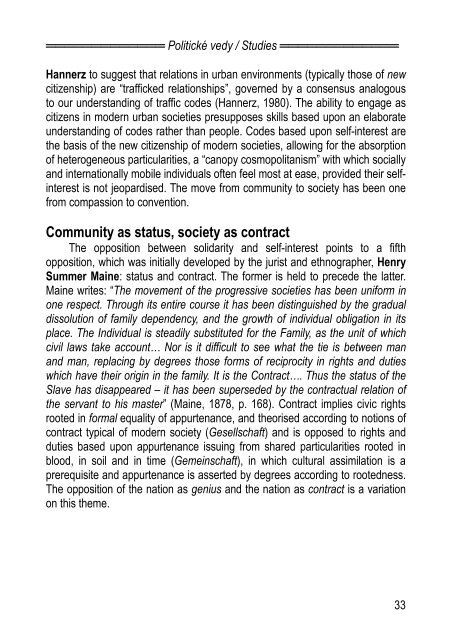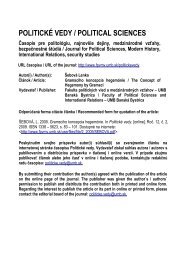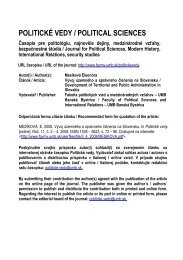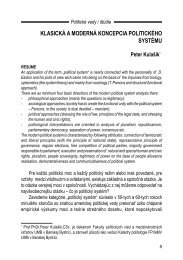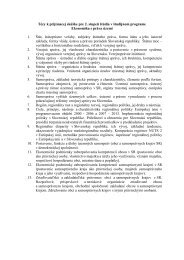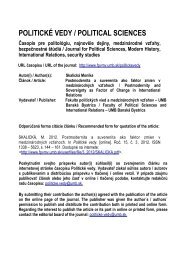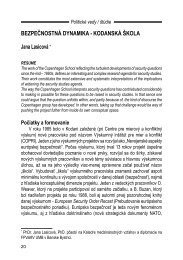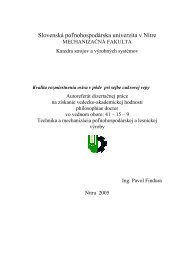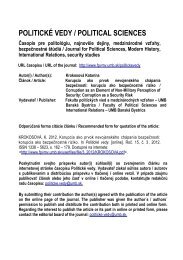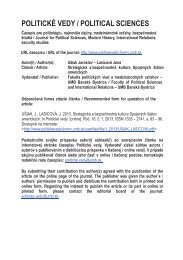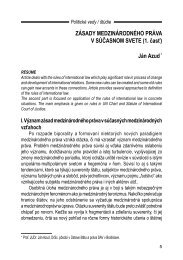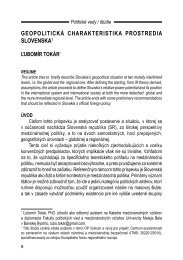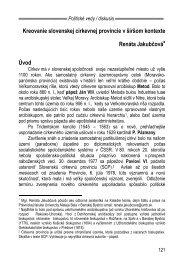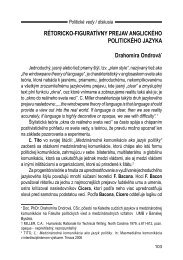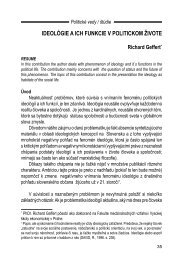Citizenship in Community and Society: Ferdinand ... - Politické vedy
Citizenship in Community and Society: Ferdinand ... - Politické vedy
Citizenship in Community and Society: Ferdinand ... - Politické vedy
You also want an ePaper? Increase the reach of your titles
YUMPU automatically turns print PDFs into web optimized ePapers that Google loves.
═════════════ Politické <strong>vedy</strong> / Studies ═════════════<br />
Hannerz to suggest that relations <strong>in</strong> urban environments (typically those of new<br />
citizenship) are “trafficked relationships”, governed by a consensus analogous<br />
to our underst<strong>and</strong><strong>in</strong>g of traffic codes (Hannerz, 1980). The ability to engage as<br />
citizens <strong>in</strong> modern urban societies presupposes skills based upon an elaborate<br />
underst<strong>and</strong><strong>in</strong>g of codes rather than people. Codes based upon self-<strong>in</strong>terest are<br />
the basis of the new citizenship of modern societies, allow<strong>in</strong>g for the absorption<br />
of heterogeneous particularities, a “canopy cosmopolitanism” with which socially<br />
<strong>and</strong> <strong>in</strong>ternationally mobile <strong>in</strong>dividuals often feel most at ease, provided their self<strong>in</strong>terest<br />
is not jeopardised. The move from community to society has been one<br />
from compassion to convention.<br />
<strong>Community</strong> as status, society as contract<br />
The opposition between solidarity <strong>and</strong> self-<strong>in</strong>terest po<strong>in</strong>ts to a fifth<br />
opposition, which was <strong>in</strong>itially developed by the jurist <strong>and</strong> ethnographer, Henry<br />
Summer Ma<strong>in</strong>e: status <strong>and</strong> contract. The former is held to precede the latter.<br />
Ma<strong>in</strong>e writes: “The movement of the progressive societies has been uniform <strong>in</strong><br />
one respect. Through its entire course it has been dist<strong>in</strong>guished by the gradual<br />
dissolution of family dependency, <strong>and</strong> the growth of <strong>in</strong>dividual obligation <strong>in</strong> its<br />
place. The Individual is steadily substituted for the Family, as the unit of which<br />
civil laws take account… Nor is it difficult to see what the tie is between man<br />
<strong>and</strong> man, replac<strong>in</strong>g by degrees those forms of reciprocity <strong>in</strong> rights <strong>and</strong> duties<br />
which have their orig<strong>in</strong> <strong>in</strong> the family. It is the Contract…. Thus the status of the<br />
Slave has disappeared – it has been superseded by the contractual relation of<br />
the servant to his master” (Ma<strong>in</strong>e, 1878, p. 168). Contract implies civic rights<br />
rooted <strong>in</strong> formal equality of appurtenance, <strong>and</strong> theorised accord<strong>in</strong>g to notions of<br />
contract typical of modern society (Gesellschaft) <strong>and</strong> is opposed to rights <strong>and</strong><br />
duties based upon appurtenance issu<strong>in</strong>g from shared particularities rooted <strong>in</strong><br />
blood, <strong>in</strong> soil <strong>and</strong> <strong>in</strong> time (Geme<strong>in</strong>schaft), <strong>in</strong> which cultural assimilation is a<br />
prerequisite <strong>and</strong> appurtenance is asserted by degrees accord<strong>in</strong>g to rootedness.<br />
The opposition of the nation as genius <strong>and</strong> the nation as contract is a variation<br />
on this theme.<br />
33


